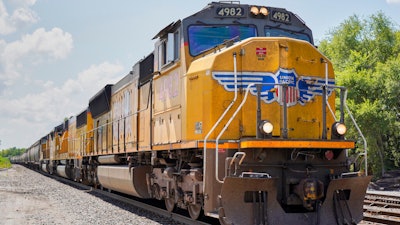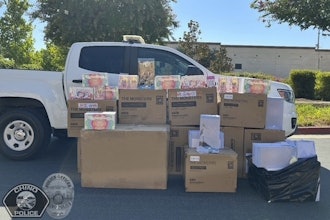
OMAHA, Neb. (AP) — Federal regulators have ordered Union Pacific railroad to make sure a livestock producer gets the grain it needs in California to prevent millions of chickens and hundreds of thousands of cattle from starving.
The U.S. Surface Transportation Board told the railroad it must improve service to Foster Farms to keep it from running out of feed for livestock it raises. It's is the second time in the past year regulators issued an emergency order related to delivery problems at Foster Farms, which is based in Livingston, California, as the railroad struggled with a shortage of crews.
This time, however, Union Pacific blamed the weather for its problems. Spokesman Mike Jaixen said last month's extreme cold and blizzard conditions slowed deliveries in 20 of the 23 western states the railroad operated in, and additional problems are possible because of the forecast for more severe winter weather.
“Union Pacific remains committed to serving all of our customers as efficiently as possible, including Foster Farms, weather permitting,” Jaixen said.
Foster Farms called on the STB to get Union Pacific to give priority to grain trains heading from the Midwest to the livestock producer's facilities in Traver, Turlock, and Delhi, California.
Union Pacific said the problems at Foster Farms should improve once five trains hauling corn that are already en route arrive, but Jaixen declined to provide an update on those trains Tuesday. The railroad is submitting updates to the STB, but it wants to keep that customer-specific information confidential.
Foster Farms attorney Thomas Wilcox said in a letter to regulators that the company has little faith that UP will deliver on its promises because the railroad has failed to deliver any of its grain trains on time in the past two weeks.
So in the meantime, Foster Farms has been buying dozens of truckloads of expensive corn to keep its chickens alive while it waits for the grain trains to be delivered, but those truck deliveries can't continue to meet its needs.
Union Pacific said its performance has improved since the spring when Foster Farms and many other shippers went before the STB to complain about chronic delivery problems at most of the major freight railroads that were disrupting their businesses.
UP and the other major freight railroads have hired hundreds of new workers since the start of the year to help them better handle all the shipments. But railroad executives acknowledge that their service still isn't meeting customer expectations and must continue to improve.
Regulators also recently criticized Union Pacific's practice of imposing limits on customer shipments as part of its effort to clear up congestion along the Omaha, Nebraska, based railroad's network of 32,400 miles (about 52,000 kilometers) of track across the Western half of the United States.



















